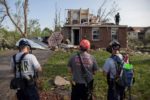Recovering from chickenpox doesn’t mean the virus is gone or that the patient is immune from later serious health problems.
The Kentucky teenager who caught chickenpoxafter refusing to be vaccinated for religious reasons may not realize there can be lifelong consequences from being infected with a herpes virus. The attorney for the family of Jerome Kunkel, 18, told NBC News that the Kentucky health department had overreacted with an order for unvaccinated students to stay away from school during a chickenpox outbreak in March.
And like its other cousin, genital herpes, varicella may be silent for many years, hiding out inside nerve cells and can reactivate later, wreaking havoc in the form of the excruciating skin disorder, shingles.
Chickenpox “is erroneously thought of as a not-too-unpleasant rite of passage of childhood,” said Dr. Nina Shapiro, a professor at the University of California, Los Angeles, School of Medicine, who is the director of pediatric otolaryngology at UCLA, and the author of “Hype: A Doctor’s Guide to Medical Myths, Exaggerated Claims, and Bad Advice — How to Tell What’s Real and What’s Not”.
The image of chickenpox as a benign disease has led to some poorly thought out behaviors, like taking children to chickenpox parties, Shapiro said in an email. A person has to have had chickenpox in order to develop shingles. If a person has never had chickenpox, they will not develop shingles.
Those kids may pay the price decades later, experts say. That’s because the chickenpox virus hides out, dormant, in nerve cells all over the body, waiting for an opportunity to explode back into action as shingles, the blistering, burning skin rash. And shingles comes with its own risks: People who developed shingles had an almost 60 percent higher risk of heart attack and a 35 percent higher risk of stroke, according to a recent study. About 1 million people develop shingles each year in the United States, according to the Centers for Disease Control and Prevention.
“Anything that weakens a person’s immune system — mental and physical stress, HIV, cancer, severe illness, surgery, medications or chemo or radiation therapies, transplant — increases that person’s risk for developing shingles no matter the age,” said Dr. Tina Tan, a professor of pediatrics at Northwestern University’s Feinberg School of Medicine and a pediatric infectious disease specialist at the Robert H. Lurie Children’s Hospital.




